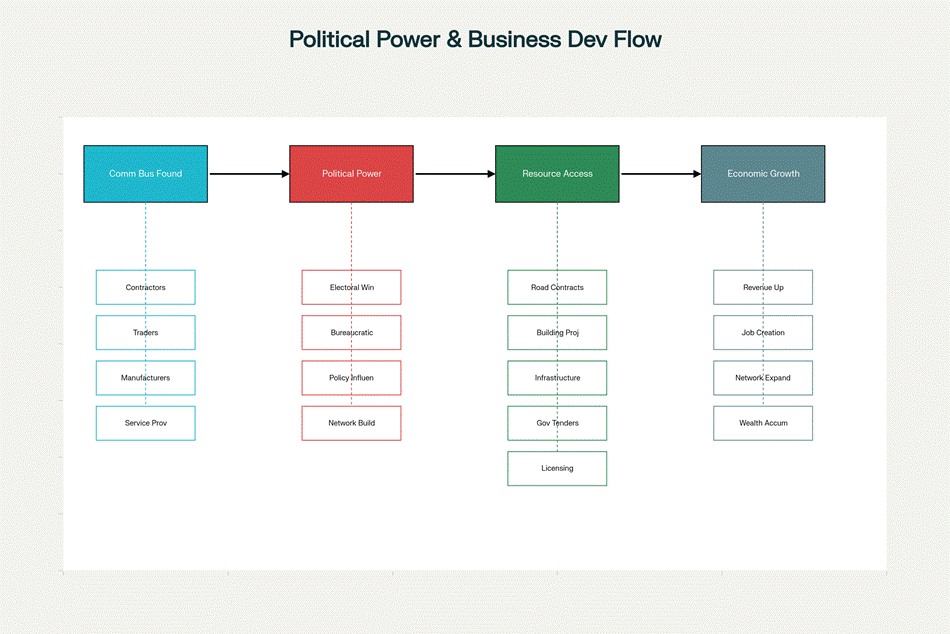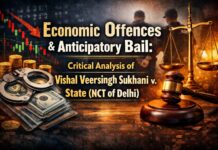Political Power as a Business Tool for Downtrodden: Why Economic Foundations Precedes Political Influence
Political power without an underlying business foundation is often ineffective for downtrodden community development. This fundamental principle suggests that downtrodden (Dalit) must first establish robust business networks before political influence can serve as a meaningful tool for economic advancement. When downtrodden community members engage in business activities—from construction and contracting to trading and manufacturing—political power becomes a strategic instrument to secure government contracts, policy advantages, and resource allocation that directly benefits their economic interests. [1][2][3][4]
The Business-First Principle in Community Development
The relationship between business establishment and political power operates on a simple yet powerful premise: political influence is most valuable when it can be leveraged to support existing economic activities. Downtrodden (Dalit) Communities that lack established business networks find political power to be of limited utility, as there are no concrete economic interests to protect or advance through policy intervention. [5][6]

The Political Power-Business Development Cycle: How Downtrodden Communities Should Leverage Political Influence for Economic Growth
Research from various contexts demonstrates that successful community political engagement invariably builds upon pre-existing business foundations. In India, studies of industrial entrepreneurship reveal how community networks first established trading and manufacturing enterprises, then leveraged political connections to secure favorable policies and contracts. The Marwari business community, for instance, established extensive trading networks across India before using political influence to protect and expand these economic interests. [5][6][7][8]
The Contractor-Politician Nexus
The construction and infrastructure sector provides perhaps the clearest illustration of this business-politics relationship. Contractors who establish themselves in local markets can leverage political connections to secure government infrastructure projects, road construction contracts, and building developments. When community members gain political office, they possess the discretionary power to influence contract allocation processes, ensuring that construction projects flow to businesses within their network. [4][9]
Evidence from India’s Pradhan Mantri Gram Sadak Yojana (PMGSY) road construction program demonstrates this dynamic clearly. Research shows that when politicians win elections, there is a significant 63% increase in the share of road contracts awarded to contractors sharing their surname, representing approximately $470 million in contracts. This preferential allocation occurs despite the program’s explicit design to prevent political interference, highlighting the persistent nature of these political-business networks. [9][4]
Mechanisms of Political Business Advantage
Contract Allocation and Procurement
Political connections provide multiple pathways for business advantage within government procurement systems. Connected businesses benefit from increased access to contract information, preferential evaluation criteria, and reduced competition through manipulation of tendering processes. Studies across various countries reveal that politically connected firms are 18-32% more likely to win public procurement contracts, primarily through access to uncompetitive tenders. [3][10][11]
The mechanisms through which this occurs include:
- Information asymmetry: Politicians provide advance notice of upcoming projects to connected businesses, allowing them to prepare superior bids
- Bureaucratic pressure: Elected officials influence civil servants responsible for contract evaluation and award decisions
- Specification manipulation: Contract requirements are crafted to favor businesses within the political network
- Post-award modifications: Connected contractors receive favorable contract amendments and payment terms
Regulatory and Policy Advantages
Beyond direct contract allocation, political connections enable businesses to secure regulatory advantages that create competitive moats. These include preferential licensing processes, relaxed compliance requirements, favorable zoning decisions, and expedited permit approvals. For established businesses, such regulatory advantages can significantly reduce operational costs and barriers to expansion. [12][13]
Political influence also enables community businesses to shape broader policy frameworks. Business communities with political representation can advocate for industry-favorable regulations, tax policies, and infrastructure investments that directly benefit their economic interests. This policy influence creates systemic advantages that benefit the entire community business ecosystem. [1][14]
Evidence from Global Contexts
India: Ethnic Business Networks and Political Patronage
The Indian context provides extensive evidence of community business networks leveraging political power. Studies of various business communities reveal consistent patterns of economic establishment preceding political engagement. The Marwari community exemplifies this approach, having first established dominance in trading and finance before entering politics to protect and expand these interests. [2][5][6][7][8]
Research on political connections in Indian firms demonstrates tangible benefits: politically connected companies show higher profits, better access to credit, and preferential treatment in government dealings. During economic crises, connected firms maintain better access to short-term credit and can delay payments to suppliers, demonstrating the protective value of political relationships for established businesses. [15][13]
International Patterns
Similar patterns emerge across different political and economic systems. In Bulgaria, politically connected firms are 20% more likely to obtain public procurement contracts, with the effect strongest among firms connected to local government officials. Hungarian data reveals that politically favored companies secure 50-60% of central government contracting markets following political transitions. [10][16]
Even in developed democracies with strong institutions, business-political networks operate effectively. Research from the United States shows systematic relationships between campaign contributions and policy outcomes favorable to contributing industries. The key difference lies not in the absence of such relationships but in their institutionalization and transparency. [17]
Historical Development and Evolution
Pre-Independence Business-Political Networks
Historical analysis of business-political relationships reveals the long-standing nature of these connections. During the colonial period in India, successful trading communities established relationships with British administrators to secure favorable policies and contract opportunities. These early business-political networks laid the foundation for post-independence political participation. [5][6]
The evolution from pure business focus to political engagement typically follows predictable stages:
- Business establishment: Communities develop specialized economic activities and accumulate capital
- Network formation: Business relationships create social capital and community solidarity
- Political entry: Successful businesspeople or their representatives enter political office
- Resource capture: Political power is used to direct government resources toward community businesses
- Institutional entrenchment: Business-political networks become embedded in local political economy
Modern Manifestations
Contemporary business-political networks operate through more sophisticated mechanisms while maintaining the same fundamental logic. Modern corporations engage in political activities through campaign contributions, lobbying, and revolving door relationships between business and government. The scale and complexity have increased, but the underlying principle remains constant: political power serves as a tool to advance pre-existing business interests. [18][19]

Political power as a tool for community business development and construction contracts
The professionalization of politics has created new opportunities for business influence. Political consulting firms, think tanks, and advocacy organizations provide mechanisms for businesses to influence policy while maintaining plausible distance from direct political engagement. These intermediary institutions allow business communities to leverage political power more effectively while reducing reputational risks. [20]
Community Development Strategies
For communities seeking economic development, the research suggests that business establishment should precede major political engagement. Communities lacking established business networks may benefit more from entrepreneurship development, skills training, and market access programs than from immediate political representation. [5][23]
However, this creates a chicken-and-egg problem: communities need political representation to secure resources for business development, but political representation is most effective when businesses already exist. Addressing this challenge requires carefully sequenced development strategies that build business capacity while gradually increasing political engagement.
Conclusion
The relationship between political power and business development reveals a fundamental truth about community economic advancement: political influence is most valuable as a tool to support and expand existing economic activities. Communities with established business networks can leverage political connections to secure government contracts, favorable policies, and resource allocation that directly benefits their economic interests. Conversely, political power without underlying business foundation often proves ineffective for meaningful community development.
This dynamic creates both opportunities and challenges for community development and democratic governance. While business-political networks can drive economic growth and community prosperity, they also raise concerns about fairness, efficiency, and institutional integrity. Understanding these relationships is crucial for developing effective policies that harness the positive aspects of business-political connections while mitigating their potential negative consequences.
The evidence suggests that successful community development requires a strategic approach that builds business capacity first, then leverages political engagement to support and expand these economic foundations. This sequence ensures that political power serves as an effective tool for community advancement rather than an empty vessel without concrete economic interests to advance.
- https://www.thegoa.com/news/the-importance-of-political-advocacy-for-your-business
- https://www.povertyactionlab.org/evaluation/importance-ethnic-networks-business-transactions-india
- https://systems.enpress-publisher.com/index.php/jipd/article/viewFile/9627/4976
- https://assets.publishing.service.gov.uk/media/57a0895be5274a31e0000032/89102_Shapiro_et_al_Working_paper.pdf
- https://edi.opml.co.uk/research/community-networks-industrial-entrepreneurship-india-china-casestudy/
- https://people.bu.edu/dilipm/wkpap/CottonEntrDec2018v4.pdf
- https://thefederal.com/category/states/south/telangana/marwari-community-faces-go-back-call-telangana-202384
- https://www.forbesindia.com/article/marwari-power/the-influence-wielded-by-marwari-business-families/37347/1
- https://www.ideasforindia.in/topics/human-development/building-connections-political-corruption-and-road-construction-in-india.html
- https://thedocs.worldbank.org/en/doc/21e81bdf718c52c67a1b1ff6e52c565c-0350012025/original/Bence-Toth-Procuring-misallocation-12-05-2024-clean.pdf
- https://openknowledge.worldbank.org/entities/publication/28a1b3bf-c4c5-4f11-8a5a-790088c0c5cd
- https://jsbs.scholasticahq.com/article/94173-political-connections-and-firm-performance-evidence-from-vietnamese-smes
- https://www.iimb.ac.in/sites/default/files/2018-07/WP_No._433.pdf
- https://www.drishtiias.com/to-the-points/Paper2/pressure-groups
- https://www.ideasforindia.in/topics/productivity-innovation/the-role-of-political-connections-of-firms-during-a-crisis.html
- https://d-nb.info/1194416667/34
- https://pmc.ncbi.nlm.nih.gov/articles/PMC2836532/
- https://www.igcimpact.com/political-influence-business-leaders-guide
- https://nbs.net/how-can-companies-use-their-political-influence-responsibly/
- https://ijoc.org/index.php/ijoc/article/download/21938/5028
- https://www.cambridge.org/core/services/aop-cambridge-core/content/view/6EA61203A3DBCFB131B7B2F8DB96E0D9/stamped-9781009199247c4_p113-172_CBO.pdf/political_patronage_underbelly_of_everyday_politics.pdf
- https://www.ebsco.com/research-starters/social-sciences-and-humanities/race-ethnicity-and-political-power
- https://www.ethniccommunities.govt.nz/__data/assets/pdf_file/0023/82607/Ethnic-communities-barriers-to-business.pdf
- https://www.strategicmanagement.net/publications-resources/strategic-management-explorer/how-entrepreneurs-develop-diverse-social-ties-even-in-divided-societies/
- https://www.powertochange.org.uk/evidence-and-ideas/news-and-events/a-community-powered-vision-for-a-new-government/
- https://yipinstitute.org/article/the-influence-of-web-communities-on-political-thought
- https://journals.sagepub.com/doi/full/10.1177/18681034241264846
- https://www.powertochange.org.uk/what-we-do/building-community-power/
- https://onlinelibrary.wiley.com/doi/10.1111/1467-923X.13140
- https://www.sciencedirect.com/science/article/pii/S0308596124001988
- https://escholarship.org/content/qt7hc733q3/qt7hc733q3_noSplash_0b1b9a891995e4785aff98a42ac660a9.pdf
- https://online.hbs.edu/blog/post/politics-and-business
- https://ignited.in/index.php/jasrae/article/view/7640/15080
- https://www.theindiaforum.in/politics/state-business-foreign-policy-india
- https://www.sciencedirect.com/science/article/pii/S2589811620300033
- https://onlinelibrary.wiley.com/doi/10.1111/tesg.12387
- https://egyankosh.ac.in/bitstream/123456789/43970/1/Unit-16.pdf
- https://www.sciencedirect.com/science/article/abs/pii/S0305750X14000138
- https://www.routledge.com/The-Political-Power-of-Business-Structure-and-Information-in-Public-Policy-Making/Bernhagen/p/book/9781138011403
- https://ic3jm.es/wp-content/uploads/2021/10/benefits_of_patronage.pdf
- https://en.wikipedia.org/wiki/Patronage
- https://www.scirp.org/journal/paperinformation?paperid=71084
- https://brill.com/view/journals/afoc/19/1-2/article-p43_3.pdf
- https://firstamendment.mtsu.edu/article/political-patronage/
- https://jfrieden.scholars.harvard.edu/file_url/349
- https://www.sciencedirect.com/science/article/pii/S0305750X25000385
- https://familybusiness.org/content/why-prominent-business-families-dive-into-politics
- https://www.sciencedirect.com/science/article/pii/S0167811696000249
- https://study.com/academy/lesson/political-patronage-definition-motives-example.html
- https://www.scribd.com/doc/19103909/Case-Studies-on-Power-and-Politics-Case
- https://study.com/academy/lesson/video/political-patronage-definition-motives-example.html
- https://www.ebsco.com/research-starters/political-science/patronage
- https://onlinelibrary.wiley.com/doi/10.1002/gsj.1148
- https://www.weforum.org/stories/2017/11/the-rise-of-the-political-entrepreneur-and-why-we-need-more-of-them/
- https://www.cambridge.org/core/books/patronage-as-politics-in-south-asia/patronage-politics-in-postindependence-india/43A5E3D7A81780516AA2311D565007AB
- https://onlinelibrary.wiley.com/doi/10.1111/joms.13134
- https://papers.ssrn.com/sol3/Delivery.cfm/SSRN_ID1906610_code1343403.pdf?abstractid=1903157&mirid=1
- https://www.sciencedirect.com/science/article/abs/pii/S0304387825000227
- https://bti-project.org/en/reports/country-report/IND
- https://www.sciencedirect.com/science/article/pii/S0176268025001028
- https://www.rroij.com/open-access/twin-policies-different-parents-the-case-of-ethnic-preferences-in-government-procurement-.php?aid=65223
- https://study.com/academy/lesson/political-influences-on-business-lesson-quiz.html
- https://voxdev.org/topic/institutions-political-economy/elections-and-corruption-politics-and-public-procurement-india
- https://www.circulai.co.uk/the-challenges-smes-and-ethnic-minority-owned-businesses-face-in-public-sector-tendering/
- https://www.sciencedirect.com/science/article/abs/pii/S104402831830084X
- https://www.sciencedirect.com/science/article/abs/pii/S0304387817300883
- https://www.sciencedirect.com/science/article/pii/S2531048817300226
- https://www.urban.org/sites/default/files/publication/67046/307416-Do-Minority-Owned-Businesses-Get-a-Fair-Share-of-Government-Contracts-.PDF
- https://compass.onlinelibrary.wiley.com/doi/10.1111/phc3.12892
- https://www.pbmares.com/federal-government-contracting-is-an-opportunity-for-minority-business-owners/
- https://academic.oup.com/qje/article-abstract/98/3/371/1852264
- https://onlinelibrary.wiley.com/doi/10.1111/beer.12608
- https://www.irenees.net/bdf_fiche-analyse-831_en.html
- https://ideas.repec.org/a/bla/rdevec/v9y2005i4p563-580.html
- https://www.iosrjournals.org/iosr-jhss/papers/Vol. 24 Issue1/Version-2/E2401024045.pdf
- https://courses.lumenlearning.com/rangercollege-ushistory2os/chapter/the-key-political-issues-patronage-tariffs-and-gold/
- https://www.beyondintractability.org/casestudy/irobi-ethnic
- https://blogs.lse.ac.uk/southasia/2014/09/08/the-marwari-business-community-is-now-a-part-of-history/
- https://www.sciencedirect.com/science/article/abs/pii/S0304387820300328
- https://en.wikipedia.org/wiki/Marwari_people
- https://journals.openedition.org/belgeo/19409
- http://irjmst.com/abstractview/2904
- https://journals.sagepub.com/doi/10.1177/18681034231219460
- https://journals.sagepub.com/doi/10.1177/13505084211018907
- https://www.executivebiz.com/articles/types-government-contracts-for-small-business
- https://www.potomacofficersclub.com/articles/types-of-government-contracts-for-small-business-to-help-you-grow/
- https://www.sba.gov/federal-contracting/contracting-guide/types-contracts
- https://academic.oup.com/book/35332/chapter/300005664
- https://info.winvale.com/blog/strategies-stand-out-government-contractors
- https://academic.oup.com/jeea/article/22/1/117/7071896
- https://fedbizaccess.com/the-10-easiest-government-contracts-to-win-a-guide-for-business-owners-exploring-government-contracting/
- https://www.sciencedirect.com/science/article/abs/pii/S0304387824000452
- https://www.govtransparency.eu/grand-corruption-and-government-change-an-analysis-of-partisan-favoritism-in-public-procurement/
- https://www.deltek.com/en/government-contracting/guide/government-contract-types
- https://steg.cepr.org/sites/default/files/2024-11/WP012 BruguesBruguesGiambra PoliticalConnectionsAndMisallocationOfProcurementContracts.pdf
- https://seldi.net/public-procurement-integrity-in-southeast-europe/public-procurement/
- https://www.youtube.com/watch?v=PsaPnj8PuCI
- https://www.nishithdesai.com/fileadmin/user_upload/pdfs/Research_Papers/Construction-disputes-in-india.pdf



















